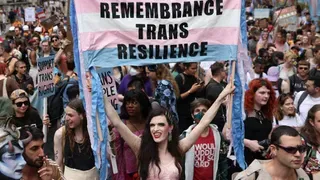July 24, 2014
AIDS Conference 'Stepping Up the Pace'
Kilian Melloy READ TIME: 4 MIN.
Delegates at the 20th International AIDS Conference, taking place this week in Melbourne, Australia, expressed optimism about progress made to date, but stressed that more remains to be done when it comes to key populations including gay men, transgender people, sex workers, and people who use drugs.
The meeting opened on a somber note Sunday as attendees remembered six colleagues - including renowned Dutch AIDS researcher Joep Lange - who were confirmed to have been killed aboard Malaysian Airlines Flight 17, which was shot down near the Russia-Ukraine border last Thursday.
But the focus of the conference soon turned to taking stock of how far advocates, researchers, and others have come in addressing the epidemic and how much remains to be done.
Under the overarching theme of "Stepping Up the Pace," 12,000 participants attended sessions devoted to advances in treatment for HIV, hepatitis C and tuberculosis, biomedical HIV prevention including pre-exposure prophylaxis or PrEP, and ending stigma and criminalization of people with HIV.
"Stepping up the pace is a perfect theme for this conference because we're on a steady march," former President Bill Clinton said during his keynote address on Wednesday. "We have proven to ourselves that the end of AIDS is possible."
AIDS advocates staged a Mobilization March during the International AIDS Conference in Melbourne, Australia. Photo: Liz Highleyman
UNAIDS Executive Director Michel Sidibe opened the conference with an overview of progress in the global response to HIV/AIDS since the last International AIDS Conference in 2012. As of July 2014, as many as 14 million people with HIV are receiving antiretroviral therapy, according to a UNAIDS estimate.
"More has been done in the last three years than in the last 25 years," Sidibe said. "We quickened the pace, and we changed completely the trajectory of the response."
Sidibe described the new UNAIDS target that calls for 90 percent of people living with HIV to be diagnosed, 90 percent of those who test positive to start treatment, and 90 percent on treatment to have undetectable viral load by 2020. In particular, he said, resources must be focused where they are most needed to address the 15 countries that account for 75 percent of new HIV infections and related deaths.
During his talk, Clinton predicted, "We can achieve the promise of World Health Organization [HIV treatment] guidelines within the existing funding envelope if we use our resources more effectively."
But treatment advocates interrupted both Sidibe's and Clinton's speeches, demanding less talk and more action.
"We demand not only the promises, but the policies, laws, and funding to make them possible," declared Amanda Banda, a coordinator of Medecins Sans Frontieres' Access Campaign.
"Today most people living with HIV outside wealthy countries don't even know their viral load because they've never had access to the test, and too many do not have the treatment they need to control the virus," said Bactrin Killingo of the International Treatment Preparedness Coalition. "This is a violation of basic human rights - all people deserve the information, medicine, and support needed to control and suppress the virus."
Related Events
The days leading up to the conference featured a full slate of sessions including an HIV cure symposium and the annual Global Forum on MSM and HIV pre-conference. The MSMGF meeting featured discussion of how new prevention technologies fit into the broader picture of health and wellness for gay and bisexual men.
"There's an extraordinary cultural shift ongoing in the gay community, especially in the U.S.," community PrEP expert Gus Cairns told the Bay Area Reporter. "A very rich and respectful discussion arose, and what we ended up agreeing on is that the PrEP debate has enabled people to start talking about things that have been a bit taboo or frozen in the HIV conversation. The PrEP debate has thrown a hand grenade into discourse about prevention in the gay community, and that can only be a good thing."
On Tuesday at the main conference, Dr. Robert Grant, an investigator at the Gladstone Institutes and medical director at the San Francisco AIDS Foundation, presented the latest data from the iPrEx Open-Label Extension, a follow-up to the pivotal study of Truvada PrEP for gay men and transgender women.
Although PrEP is intended to be taken daily, the study found that it remains effective if people take it at least four times per week. In addition, there was no evidence of increased sexual risk-taking among people using PrEP in the trial.
"Daily dosing of PrEP is recommended, because it helps foster the habit of consistent PrEP use and increases drug levels in the body, providing the best safety cushion for individuals who occasionally miss doses," Grant said. "At the same time, these results demonstrate that PrEP remains highly effective, even in real-world circumstances in which adherence may not be perfect."
Another pre-conference event - Beyond Blame: Challenging HIV Criminalization - focused on the ways discrimination against and criminalization of people with HIV hamper the response to the epidemic. Laws that target gay men, sex workers, and drug users also keep people from accessing HIV prevention and treatment and create an enabling environment for the spread of the epidemic, advocates proclaimed.
On Tuesday evening activists and conference delegates joined forces for a Mobilization March that ended with a candlelight vigil in central Melbourne. Key demands included an end to discrimination and criminalization, more funding for prevention and treatment, and lowering the cost of drugs for HIV and hepatitis C.
"Stop criminalizing sex workers, stop criminalizing drug users, and stop making a killing on our lives," declared HealthGAP organizer Michael Tikili.
Kilian Melloy serves as EDGE Media Network's Associate Arts Editor and Staff Contributor. His professional memberships include the National Lesbian & Gay Journalists Association, the Boston Online Film Critics Association, The Gay and Lesbian Entertainment Critics Association, and the Boston Theater Critics Association's Elliot Norton Awards Committee.






